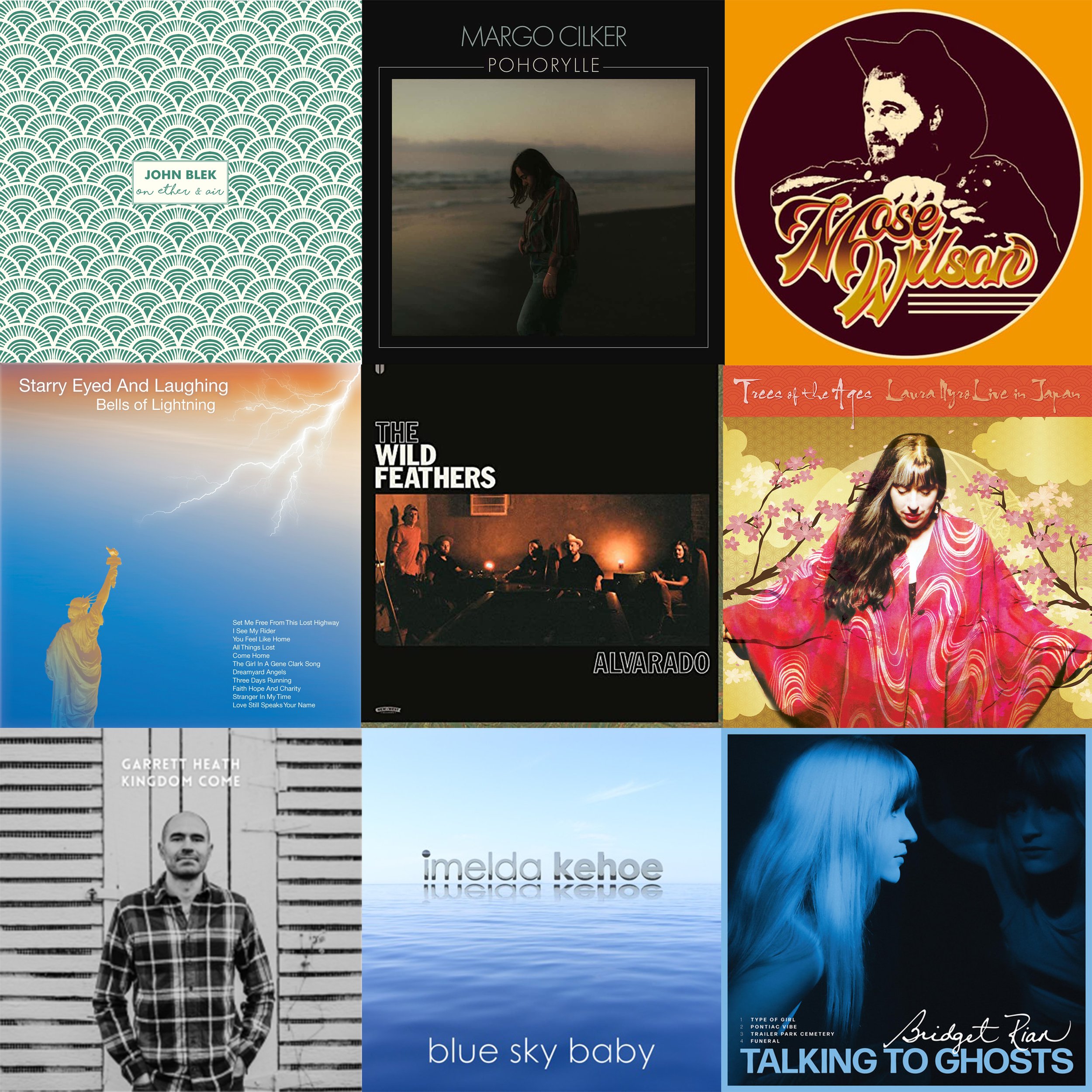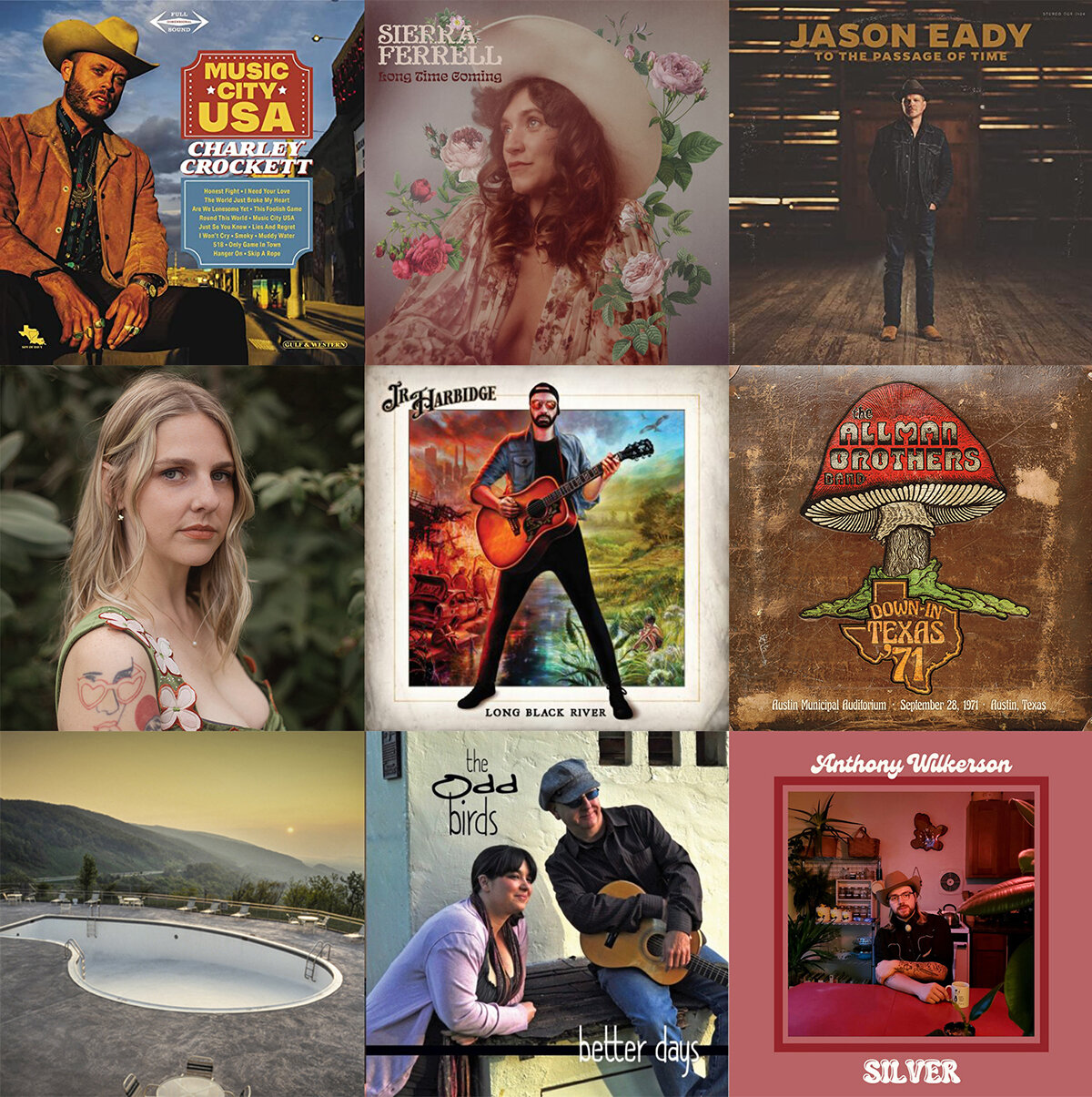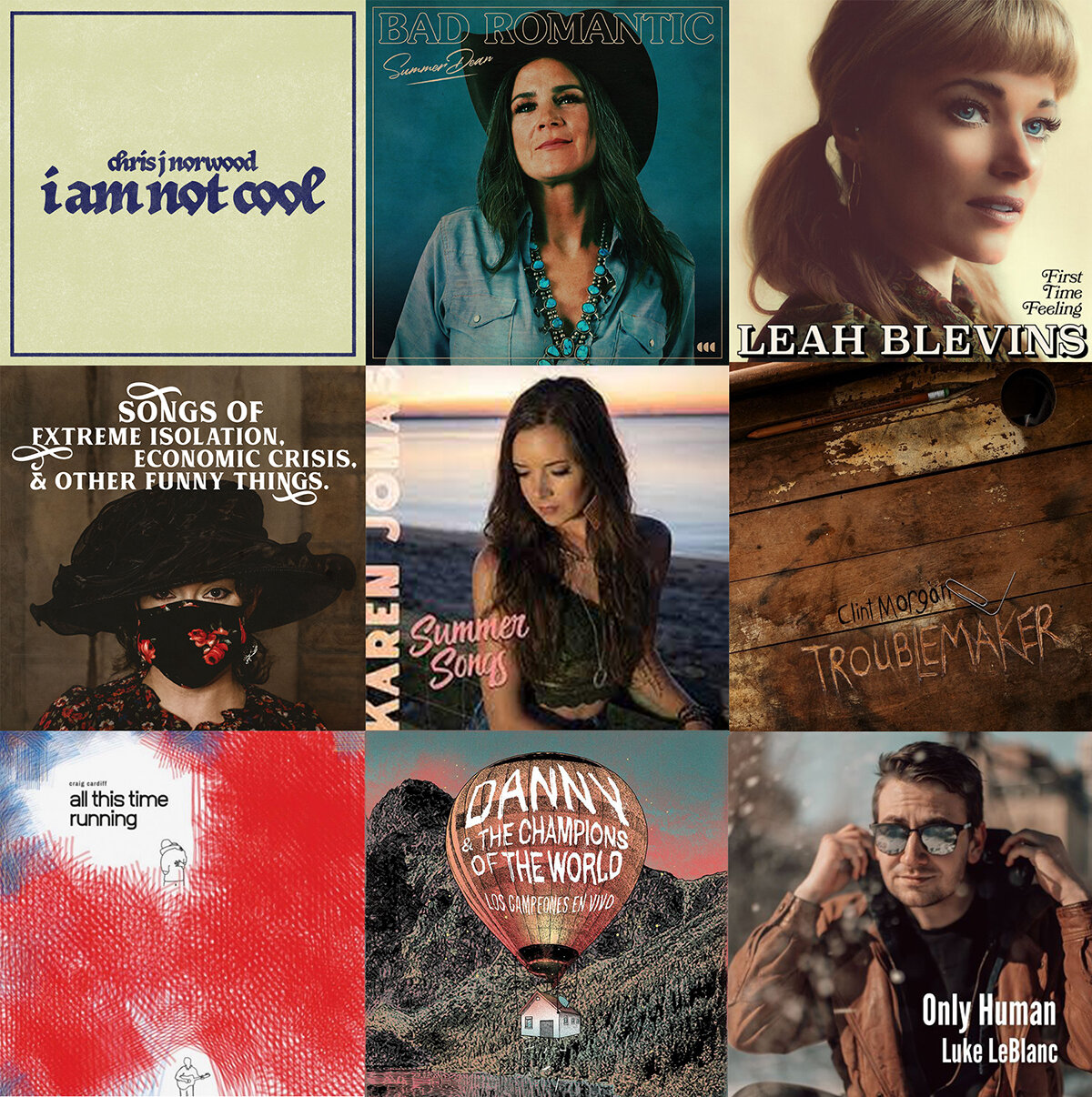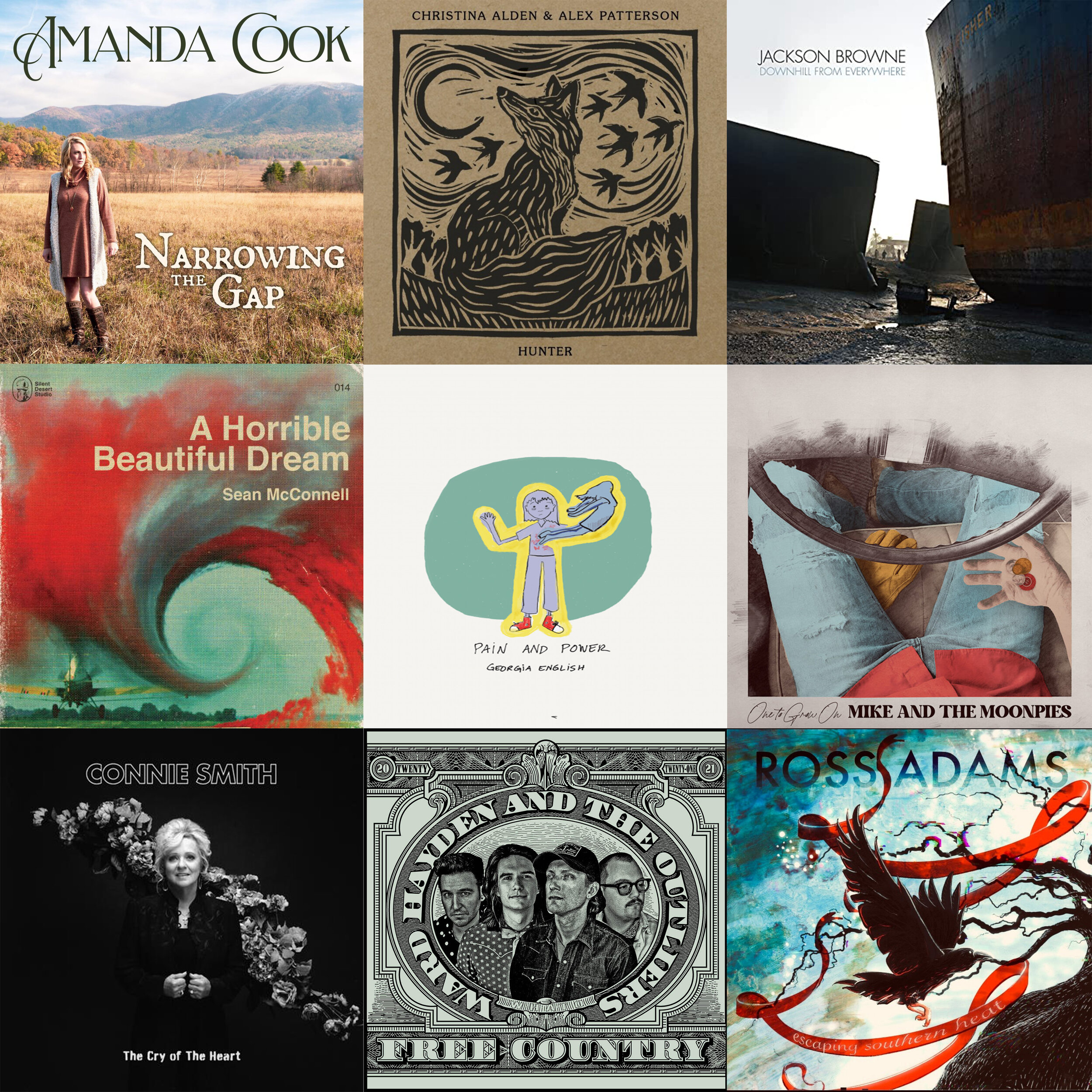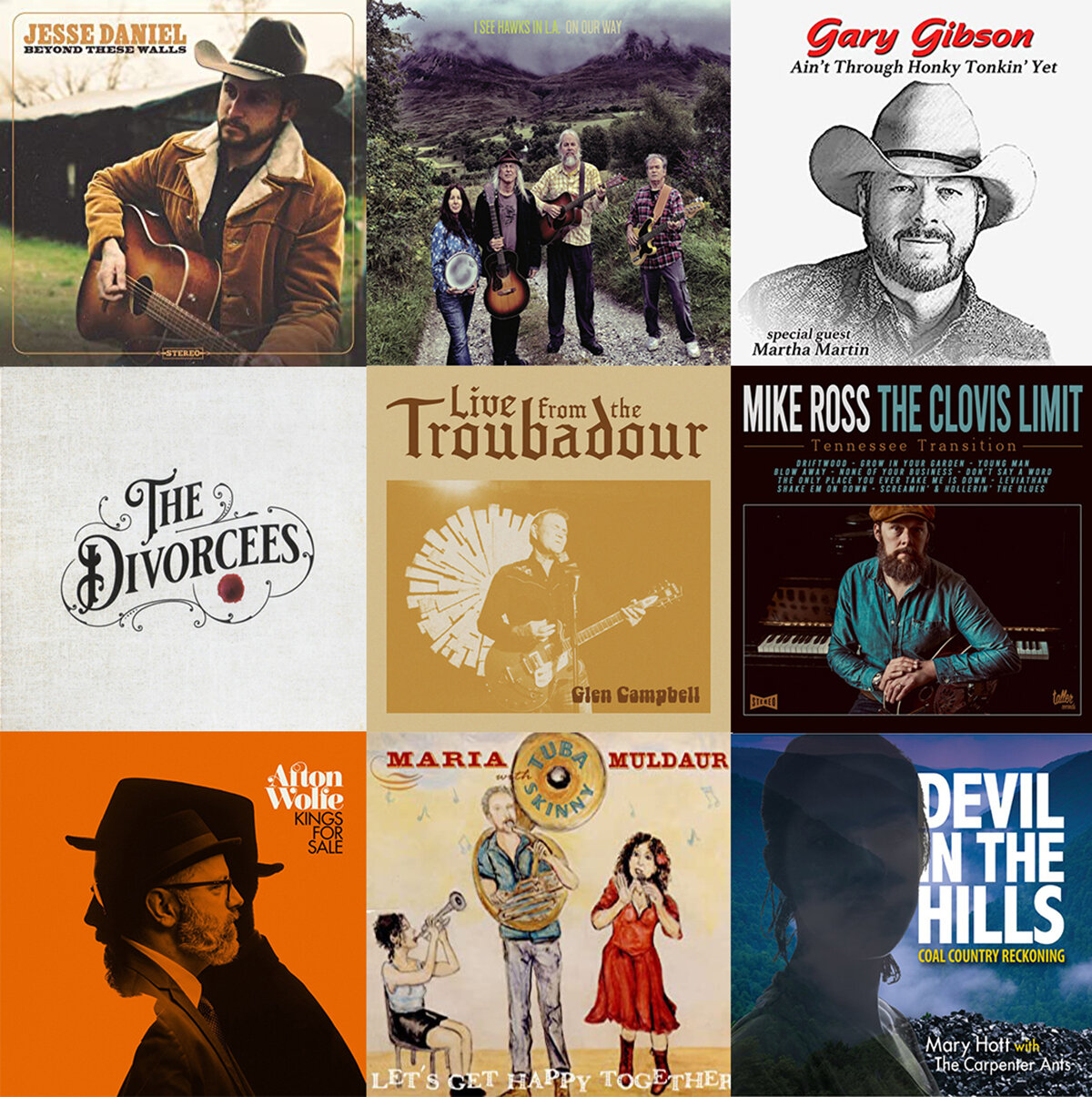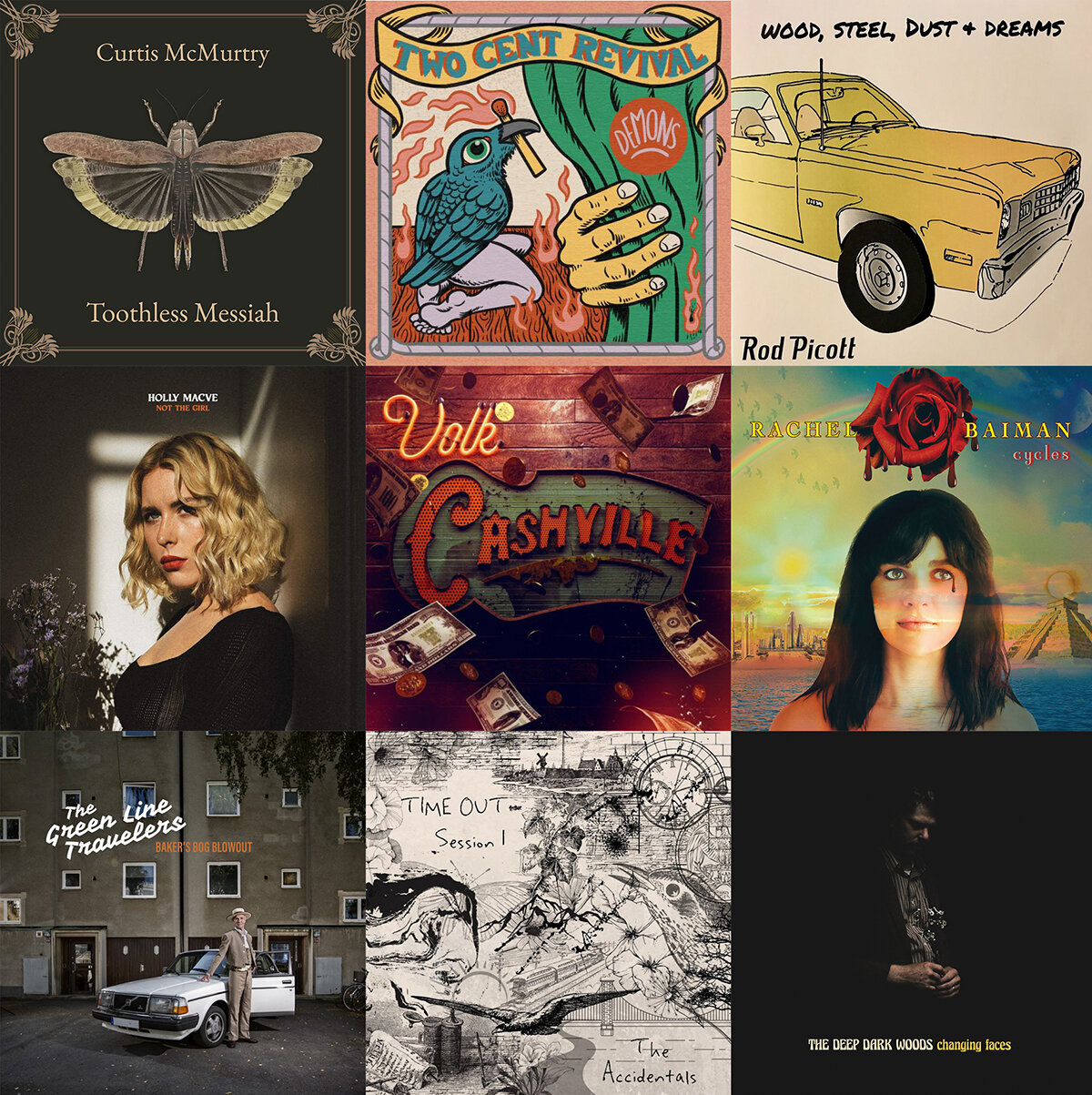John Blek On Ether & Air Warr
Prolific singer songwriter, and one of Ireland’s best kept secrets, Corkonian John Blek has launched his latest album, the completion of a quartet of work that he began when he was ill in 2016. Dubbed the Catharsis project, each of the four albums is based on one of the four classical elements; water, earth, fire and air. This album was completed in 2019, but Blek held back on the release so that he could tour the album, to give it the momentum he felt it deserves. As someone who loves touring, he found that delay frustrating but he has come back to gigging with his usual passion and humour.
Returning again to record in Brian Casey’s West Cork Wavefield Recordings studio, the album is another tour de force in Blek’s already impressive portfolio. Casey co-produces and plays bass, organ, synth, piano and percussion. As well as Blek’s own guitar, banjo and lead vocals, Kit Downes is ever present and ever impressive on piano.
The twin themes of birds and and the sea are used in Cormorant to express the loneliness of separation or space (ether & air) between us and our loved ones. The protagonist is a fisherman who must leave his pregnant wife ashore for many months, and he’s counting down the lonely days and nights until the simple refrain can be fulfilled, ‘cast off, take me back, cormorant’. Known for his collaborations, Blek brought on board Scotland’s Kris Drever on guitar here, Lea Miklody contributes cello and, combined with Kit Downes’ piano, there’s a decidedly retro feel to the arrangement here which calls to mind ‘70s country/folk ballads. Drever is also on hand to play guitar and contribute backing vocals on Forest Strong, when Blek switches to banjo for this folky metaphorical expression of the steadfastness of collaboration, even if one element goes astray - ‘the tree is weak when stood alone, the forest strong when wild winds blow’. In Flight demonstrates Blek’s folk credentials, with his superb finger picking (heavily influenced as he is by his hero Bert Jansch) and interplay with delicate piano and cello on another avian themed observation of loss, ‘Who drew the feathers on your skin? Lines so delicate and thin … floating on ether and air’. Simply beautiful.
Northern Sky is a truly epic cinematic sweep of a song based on ‘the Troubles’ in Northern Ireland, perhaps influenced by his many successful gigs in that part of the country. He carries off the difficult feat of remaining impartial and non-judgemental, all the while producing a powerful emotive piece, conveyed with the help of a heavy bass and drum beat, dramatic piano chords and echoed layers. ‘Living in a border town the blood is thicker than the water flowing underground. There’ll be no shelter in the shadow of the flags’
Long Strand is a reminiscence of staying up all night on a beach, watching the fire’s embers fading as the sun comes up, ‘long nights on long strand, the white noise of the waves shifting the sand’. Empty Days is used as an opportunity for another collaboration, this time with violinist Cheyenne Mize (Bonny Prince Billy) who also lends ethereal backing vocals to another bitter sweet evocation of separation.
Luckily for his growing legion of fans in Ireland and Europe, John Blek has several album’s worth of material ready to put down, when time permits. This one will keep us more than satisfied in the meantime.
Review by Eilís Boland
Margo Cilker Pohorylle Loose
The title of the debut album from California born singer songwriter Margo Cilker is the brand name of a Spanish manufacturer of backpacks. The selection of POHORYLLE as the album title would appear to stem from the time spent by Cilker in the Basque region of Spain and a reflection of her nomadic lifestyle of recent years. Those years found the inquisitorial artist constantly travelling across the world, drawing inspiration from the various geographical environments she encountered. The inevitable isolation of the touring musician also feeds into a number of the album’s songs.
With the songs for the album developed and primed for recording, Cilker sought out a producer to transform the material into the distinct sound she had in mind. That search brought her to the door of singer songwriter Sera Cahoone, whose recent albums, co-produced with John Morgan Askew, captured the precise sound that Cilker was striving for. Cahoone gathered a crack team of players for the recording, which included seasoned players such as Jenny Conlee (The Decemberists) on keys, Jason Kardong (Sera Cahoone, Son Volt) on pedal steel, Rebecca Young (Lindsey Fuller, Jesse Sykes) on bass, Mirabai Peart (Joanna Newsom) on strings, Kelly Pratt (Beirut) on horns, and the album’s engineer John Morgan Askew (Neko Case, Laura Gibson) on an array of other instruments.
Despite that ‘A’ list of players and the extent of the instrumentation employed on the album, the resulting sound is very much uncluttered, with Cilker’s vocals, articulating her unfolding tales, very much out front. Tehachapi takes its name from a small town in Kern County, California, and includes references to an unfulfilled romance. It’s driven by a horn-filled dynamic backbeat behind Cilker’s considered lyrics (‘Told you I was willin’, but you heard struggling,’Tell me how does a girl with a family like yours end up so desperate?’). Matters of the heart also surface on Broken Arm in Oregon.
The tour de force on the album is the stunning closing track Wine In The World, which finds Cilker’s recollections shift from the past to the present. Memorable and also more troubled retrospections surface in the song, including time spent with a lover, her grandfather’s passing, immortality, and her insatiable wanderlust. Large doses of pedal steel courtesy of Jason Kardong are the perfect accompaniment to Cilker’s disciplined vocal delivery on the song.
A sense of freedom and non-confinement is captured on The River, the first single taken from the album. Elsewhere, Cilker considers where different life choices might have led her on Brother, Taxman, Preacher, while once more addressing her restfulness on the beautiful brooding ballad Chester’s (‘I’ve made my bed on the side of the road’).
POHORYLLE serves up a potent and thought-provoking collection of songs, all recounted with vocals that are rich in emotion from an artist well worth your attention.
Review by Declan Culliton
Mose Wilson Self-Titled Self Release
I came across Mose Wilson earlier this year when he was credited as the co - producer on a most impressive album from Hannah Juanita, titled HARDLINER. Wilson also played guitar and bass on that fine collection of genuine country songs. Further research revealed a lifetime in music for the artist who was born and reared in Cowan, Tennessee, ninety miles south of Nashville.
Wilson’s background includes singing in his local Church of Christ at the age of five. That church does not allow any instrumentation during service, resulting in him performing old country songs acapella style. He relocated to Nashville at the age of eighteen, spending three years in Music City, fronting Mose Wilson and West King String Band. His next move was to Florida’s Gulf Coast with his band Hotel Oscar, who toured regularly, playing musical styles that varied from straight country to blues, and soul to rock. Currently residing back in Nashville, Wilson has graced the stages of all the regular honky joints in Music City, including Robert’s Western World and Dee’s Cocktail Lounge.
This self-titled album is a blast of traditional country, filled with two - steppers and waltzes. Reminding himself of the acclaimed Nashville songwriter Harlan Howard’s quote that ‘only an idiot takes longer than 3 minutes to tell a story’, the eleven tracks are delivered in under thirty-five minutes. He called on the cream of Nashville’s session players to join him at Compass Records Studio on Music Row for the recording, which he co-produced with Matt Coles (Josh Turner, Blake Shelton, Dan & Shay). Dennis Crouch (Robert Plant, Elton John, Allison Krauss) played bass and Grammy nominated and Grand Ole Opry regular, Trey Hensley, was his guitarist of choice. Miles Miller, who drums for Sturgill Simpson, also features, alongside fiddle player Casey Driscoll and pedal steel player Dan Dugmore, who was previously a member of Linda Ronstadt’s band as well as an A-list session player.
Collectively, and with Wilson’s versatile vocal deliveries, they breathe classic country vibes on an album that is most certainly ‘all killer and no filler’. Striking the perfect balance between upbeat two - steppers and more relaxed country ballads, knees up songs such as Louisiana Two Step and Don’t Need You are nestled alongside the less muscular Arkansas and the tear jerkers I’m Blue and Burnin’ Memory. The bluegrass flavoured Cornered showcases the calibre of the players and the album also includes some quality Countrypolitan with This Time It’s You.
Wilson’s debut album is classic upbeat country fare. With gloriously uncluttered playing, Wilson’s slightly weather-beaten vocals, and songs forged from traditional and contemporary country roots, it’s up there with the best country album I’ve heard this year. Well worth checking out.
Review by Declan Culliton
Starry Eyed And Laughing Bells of Lightning Aurora
Over forty-five years since their last recording and eight years since the recording of the first songs for BELLS OF LIGHTNING commenced, the latest album from Starry Eyed And Laughing finally gets its release. Having started writing songs with the band’s bass player Iain Whitmore in 2013, an illness to Tony Poole, when he contracted polymyalgia, delayed the completion of the album. This was a further stroke of misfortune and a continuation of the bad breaks that the band seemed dogged with in their earlier days.
Their mishaps included Poole being electrocuted on stage at Atlanta on the first gig of their 1975 U.S. tour and the band being stuck in Boston for three days due to flooding on the same tour. The final catastrophe that was visited on them was the folding of their management company, which finally derailed the band. The advent of punk rock in the mid-‘70s did not help their cause either, rendering their twangy country rock unfashionable.
The song writing on this album includes six of the eleven tracks being credited to Poole, four to Whitmore, and one co-write. Lead vocals are also shared, Whitmore plays bass and acoustic guitar, with all other instruments played by Poole. Set Me Free From This Lost Highway, the opening track, signposts the album’s direction from the word go. Groovy bass lines, gorgeous harmony vocals, and Poole’s trademark Rickenbacker offer a mouth-watering introduction and that standard is matched on the ten tracks that follow.
Interestingly, the album includes reconnections from their early days. Dreamyard Angels revisits incidents from the 1975 U.S. tour, with references to Poole’s electrocution and being joined on stage by The Flying Burrito Brothers. The song also includes lyrics written by Poole the day after his hospitalisation. The days stranded in flooded Boston are addressed on Three Days Running. Faith and Hope and Charity alludes to the band rise and fall and eventual demise when arriving back in the U.K to a bankrupt management company. Other high points, both heavily influenced by The Byrds, include The Girl In A Gene Clark Song and I See My Rider, before they sign off with the spacey and psychedelic Love Still Speaks Your Name.
Hopefully BELLS OF LIGHTNING - the title is taken from The Byrds’ Chimes of Freedom - will expand the band’s cult status and bring them to the attention of a wider audience. The Byrds may have effectively set the template for the musical direction of Starry Eyed And Laughing from the outset and this album, laden with hooks, jangle and twang, is like unearthing a previously unreleased recording from The Byrds. A great listen from start to finish, rather than putting closure on the incredible history of Starry Eyed And Laughing, it could actually relaunch their career. Let’s hope so.
Review by Declan Culliton
The Wild Feathers Alvarado New West
With four studio albums, one live album and tours supporting Bob Dylan, Willie Nelson, and Bob Seger, Nashville based alt-rockers The Wild Feathers have been signed to New West Records and have released their strongest album to date. The five-piece band’s members are Joel King, Ricky Young, Taylor Burns, Ben Dumas and Brett Moore.
ALVARADO is very much a pandemic conceived album. Following the cancellation of a tour supporting Blackberry Smoke, they holed up in a small cabin in VanLeer, Tennessee and recorded fourteen songs in just four days. Twelve of those songs make up this self-produced southern country rock flavoured record, which was recorded at that small cabin, using the limited resources available to them. The minor final touches were applied by Joel King in his home studio in Madison, Tennessee. Their objective, production wise, was to recreate the band’s live sound, which they have achieved hands down. The recording limitations are far from evident on the final product, which blends driving, hook filled power pop (Ain’t Looking, Side Street Shakedown) with less muscular but equally impressive delights (Get Out Of My Way, Over The Edge, Off Your Shoulders), each of which bring to mind The Jayhawks at their most melodic.
The title track Alvarado was originally written for the band’s self-titled debut album back in 2013. Left on the shelf since then, they felt that it was best suited to open this album and it does so with some impact, setting the bar at a high level for the tracks that follow. It’s a relaxed rocker loaded with sweet harmonies and driven guitar riffs and breaks.
The only poser I’m left with after numerous spins of this album, is how these guys are still slightly under the radar. Possibly, with New West in their corner, ALVARADO will be their breakthrough record.
Review by Declan Culliton
Laura Nyro Trees Of the Ages / Go Find the Moon Omnivore
Where do we draw that invisible line between genre fluid music and intuitive genius that defies all categorisation? Very few artists have that special gift to rise above the media noise that attempts to place their creative muse in a neat little box.
Laura Nyro was one of those artists; someone who always walked that line. Her musical vision flowed through her playing and her writing, with fearless risks taken in self-expression and individualistic creativity of the music she heard in her head. The song arrangements could be somewhat idiosyncratic, very much Nyro’s own personal stamp. Her timing and note patterns on piano were rooted in jazz and soul, plus a healthy amount of improvisation and flights of fancy. One thing however, her enduring brilliance always shone through.
The twenty-one songs featured here were all taken from 1994 live concerts, recorded on a tour of Japan. The album runs just over one hour and includes six covers of old standards that Nyro often added into her set lists A very eclectic mix of choices, all of which show the diverse span of Nyro’s interests and influences. Included in this concert were, Dedicated To the One I Love (Pauling/Bass), Ooh Baby Baby (Robinson/Moore); Walk On By (Bacharach/David), Let It Be Me (Bécaud, Curtis, Delanoë), Oh Yeah, Maybe Baby (Spector, Hunter) and The Wind (Edwards, Brown, Strong).
As always, Nyro stamps her own personality on each one, transforming the arrangements and melodies to suit her interpretation of the feel and mood. Her piano playing is always subtle, understated and supporting that beautiful voice that just exudes soul in a passionate channelling of the blues. Her musicality was without doubt a standard that few female artists could aspire to; that tone and unique vision to create her own sound.
Accompanied by the superb harmony vocals of Diane Wilson, Diane Garisto and Dian Sorrell, we can only wonder at the power created; with Nyro on just piano and vocals, in addition to providing all the harmony arrangements. The absence of any band only heightens the performance levels with such a stripped-back purity.
Many female artists followed in her footsteps, from Carole King to Joni Mitchell, but few had that singular spark that heightened the live performance in space and time. The album, Walk the Dog and Light the Light, is featured with eight songs, having just been released back in ‘94, and A Woman’s World; Louise’s Church; Lite A Flame; To A Child; The Descent Of Luna Rose; Art Of Love; Broken Rainbow and the title track, form the core of this live set. There are also renditions of My Innocence, blending into Sophia, both taken from successive albums, Nested and Mother’s Spiritual from the 1980s. Wedding Bell Blues, together with And When I Die, first appeared on her debut album from 1967, More Than A New Discovery.
Emmie (Eli and the Thirteenth Confession), Trees Of the Ages (Mother’s Spiritual) are also featured in such a wide representation of her material across the years. The harmony singing steals the day, delivering pure soul and beautiful voices raised in praise of a higher force that runs through these songs. It stands as another terrific example of the talent that was lost when she died and for those who had the privilege of catching Nyro in a live setting, these concert tour highlights will bring a tear to the eye. Timeless.
Laura Nyro Go Find the Moon Omnivore
These are rough demos that have surfaced from the studio vaults and they are taken from an early session with producer, Milt Okun. We hear Laura in conversation, asked by her producer if she knew any songs that aren’t her own! Okum seems disappointed that she only knows snatches of other artist’s work and then settles for one more of her own – pure gold and an insight into record industry patriarchy that you just couldn’t make up!
This was an audition tape recorded in 1966 when Nyro was only eighteen years old. It’s a fascinating glimpse of a young artist on the threshold, an unknown talent - even if Okun did eventually produce her debut album. Not to be both captured and enthralled by the pure soul and jazz-based blues that poured forth when Laura sang, beggars belief… Some of the songs made it to official releases over succeeding years (And When I Die; Luckie; Lazy Susan), while others were never officially recorded (Enough Of You; In and Out; Go Find the Moon), yet the vitality of her voice, the odd phrasings of her delivery and individualistic piano playing, are all present, even at this tender age.
It is only sixteen minutes in length but it gives a unique insight into the talent that was about to emerge, as Nyro released a body of work that is still held in high esteem today. She died, age 49, in 1997, from ovarian cancer; the same disease that had taken her mother at the same age. A tragedy for all and who knows what further heights Nyro may have achieved. This release and others like it over the years bear testament to her lingering memory.
Reviews by Paul McGee
Garrett Heath Kingdom Come Self Release
This new release from singer song-writer Garrett Heath is a very interesting collection of songs and proof of an undisputed talent. Heath lives in rural Knox, Pennsylvania and this album was created in his recording studio, Okiejoke Audio Sound. The nine tracks run over thirty-four minutes of understated playing , gentle melody and lyrics that display a spiritual leaning.
The messages of hope and love across these songs appear to come from a place of peace and belief in what lies above and beyond this mortal coil. Heath has faith in the distance and in looking for reasons to believe in the enduring message that love always conquers hate.
In the title track, Kingdom Come, he sings, ‘We’re all looking for hope in all this pain,’ and the empathy with everyman is plain. We all must suffer the days of rain and stormy weather, in order to come into the sunshine. Equally, with, The Feast, Heath sings of leaving excessive pride behind and losing the urge to fight, ‘But only love puts the fear in your enemy’s eyes, Leave your guns at the door, you don’t need ‘em no more.’
Heath uses his spiritual message well and never beats the listener over the head, even if there are references to the mercy of God and, as a divine entity, King of all kings. The song, When God Had a Son, says ‘He told us the world would hate us like it hated him,’ not so sure where this is referenced in the Bible, however the sentiment is to look towards the light and to live in loving awareness. Indeed, the track, Epilogue: A Light, speaks of this very image and states, ‘ There’s a light, hidden deep inside you and me.’
The message in the opening song, You’ll Find Me, is to look for love and grace in all that surrounds us and to embrace the joys we find in each other. Two tracks, Wait For Mercy and Rise Up From Your Sleep, address the issues of belief in yourself and in living a worthy life. The music is beautifully
restrained, circling around acoustic-based songs, lifted by harmonica and guitars that complement the gentle vocal delivery of Heath and leaving plenty of space in the arrangements.
Production credits are simple… all production, instrumentation, engineering, and mixing was delivered by Heath, with mastering by Pete Lyman at Infrasonic Sound in Nashville. This singer songwriter is well worth investigation and has delivered a very strong album.
Review by Paul McGee
Imelda Kehoe Blue Sky Dreaming Thoroughbred
A second album from Irish based musician and song writer Imelda Kehoe is always worth waiting for. Her debut release, How To Be Human, was released back in 2018 and this latest offering was recorded between Windmill Lane Recording Studios, Dublin and The Orchard Recording Studios, Wexford. Trying to bring everything together during a pandemic cannot be easy, especially when there are a number of different musical friends and an array of great talent to bring to the project.
Collaborating with a core band that includes Michael Egan (Lead and Rhythm Guitar), Declan Cosgrove (Piano), Lee Byrne (Bass), James O’Sullivan (Fiddle & Guitar) and Sean O’Leary (Drums); Kehoe also decided to call upon some of her international music contacts. Contributing key parts from remote destinations are; Hugo Iglesias (bass and drums, 3 tracks); Dakota Holden (pedal steel); Horacio Valdivieso (classical and electric guitar, 5 tracks); Hugo Lee (saxophone); Meredith Moore (French horn); Sarah Mallock (electric violin). Rick Curran provided all string section parts and the entire album was overseen by producers Darragh Nolan and Brendan Carthy, David Redfearn and Michael Egan, across the two studios.
The production is light and full of sweet separation on all instruments, making the listening experience one of quiet relaxation. The fact that these twelve songs came together across the continents and in different studio locations is a tribute to all involved, with a seamless sound and gentle, understated performances to support the lovely melodies. Kehoe is very adept vocal phrasing and knows exactly when to hold back and when to elevate a tune with her beautiful vocal delivery. She sits right into the pocket with these stellar musicians and the track, Is That All, gives a perfect example of the harmonious space shared by these players, with an extended violin solo really adding great energy to the melody.
Kehoe slots into a contemporary Folk category but she also presents plenty of other genre jumping off points; such as the very sweet and easy, trad sound of The Bird Song or the slow sweep of Homeland, an instrumental piece, plucked straight from the mists of the Irish landscape, complete with lush orchestration and meditative violin. Beautifully delivered and a stand out among a number of excellent songs. Everything I Don’t Know has a simple acoustic guitar arrangement and highlights the pure vocal of Kehoe as she soars on harmony parts and delivers a wistful melodic performance.
Other songs include a cover version of Walk Away Renee (Brown, Calilli, Sansone), the classic song from the 60s, also covered by The Four Tops. Kehoe interprets the song in a slow thoughtful arrangement that brings out the heartbreak in the words and delivers a fine rendition. The title track, Blue Sky Baby, is another terrific song, a real taste of sweetly sad longing wrapped in a restrained piano and violin delivery, that builds in harmony with subtle strings. The pedal steel playing on Thirty Miles West Of Denver is another high point, adding a layer of regret to the words and soft melody of the song.
All in all, this is a very confident return from Imelda Kehoe, displaying a greater maturity, and the overall feel and warmth of the performance and production point to high quality standards throughout.
Review by Paul McGee
Bridget Rian Talking To Ghosts Self Release
This is a debut 4-track release from a young artist, based in Nashville, who brings her talents to The Smoakstack studios and benefits from the uncluttered production of Paul Moak. Rian has a sweet vocal tone and she delivers a confident performance across these mid-tempo tracks that deal with emotional issues of the head and heart.
She plays acoustic guitar, in addition to vocal duties, and she is joined by local musicians, Ethan Luck (bass, guitar, lap steel), Caleb Crosby (drums, vibraphone), Kris Donegan (electric guitars, lap steel) and producer Paul Moak on piano, B3, mellotron, acoustic guitars and backing vocals.
The song arrangements are perfectly suited to Rians’ gentle delivery and opening track, Type Of Girl, speaks about female empowerment and being able to say “No,” when confronted with a delicate situation; ‘Maybe I’m stupid to think that you’re the one, When all the signs are telling me to get up and run.’
Pontiac Vibe is a song that recalls a car accident that the song writer came across one night, and the thoughts about who the driver was, have lingered with her; ‘Sitting at a green light with the doors open, A red Pontiac vibe from Michigan, Blue lights shining through the night, White sheet on the driver's side.’
Trailer Park Cemetery is a slow tempo song about wanting to be buried in a place of your own choosing; ‘I don’t want peace and quiet, It’s overrated anyway, I’ll take loud voices, Over silence any day, I don’t ask for much, Just wanna pick where my body lays.’ Interesting subject matter for a song. The music is excellent with strummed acoustic guitars and atmospheric lap steel giving the song added depth.
Final track, Funeral, is a regret at the passing of a close friend and missing the funeral. It’s a touching reflection on the helplessness of such situations and the pain that always lingers; ‘ I’ve been working all damn day, Praying that I won’t see your face, In strangers that pass by me, And in thoughts that won’t seem to fade.’
This lady can write a song, and no doubting the talent that is on display here. I thought of Kacey Musgraves and the fledgling start to her career. Like Kacey, Bridget Rian started writing her own songs at a young age (eleven years) and her NYC upbringing has given her the belief to take her talents down to Nashville in search of her dreams. I have a quiet feeling that we will be hearing much more from this undoubted talent and I wish her “Bonne Chance” in her ongoing development as a music artist.
Review by Paul McGee

